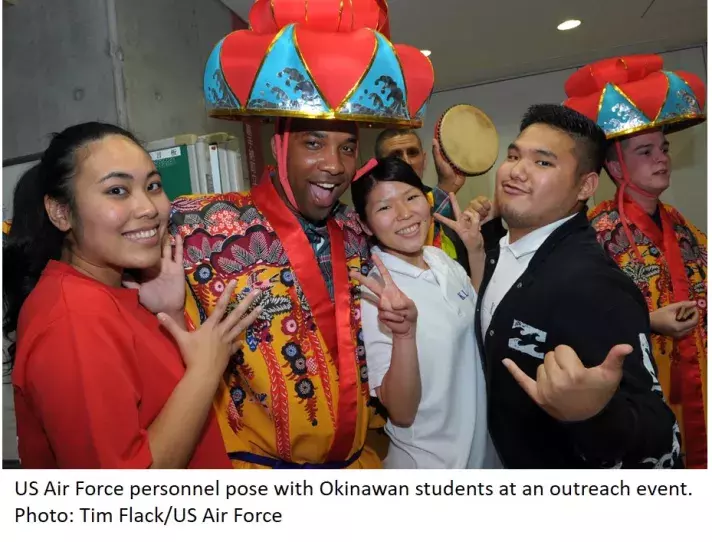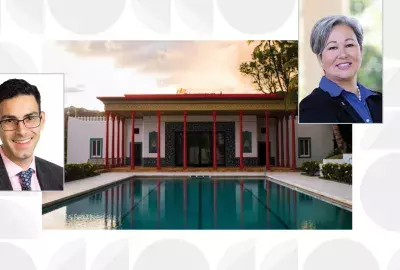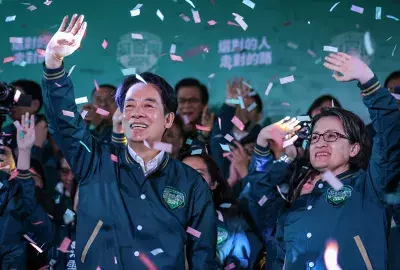Error message

Many have mixed views on the bases and are more concerned with other issues
HONOLULU (April 18, 2019)—A new East-West Center report on the attitudes of younger Okinawans toward the islands’ US military bases has found that many have mixed feeling about the bases and are often more concerned with other issues such as jobs, the economy, and the possibility of natural disasters.
Authored by former East-West Center President Charles E. Morrison and EWC representative in Okinawa Daniel Chinen, the report, titled Millennial+ Voices in Okinawa: An Inquiry into the Attitudes of Young Adults toward the Presence of U.S. Bases, is based on dozens of interviews with adult Okinawans under the age of 45, as well as an anonymous online survey. Funding for the report was provided by the United States-Japan Foundation.
This age group currently makes up about one-third of Okinawa’s population and 40 percent of its eligible voters. Born after 1972, they had no direct experience of the 1945–1972 US administration of the island. The study results suggest that:
- Many Okinawans under the age of 45 do not have strong views on the bases, but among those who do a large majority oppose their presence. Fully half of the survey’s respondents said they could not decide whether the US bases were good or bad for Okinawa. But the other half opposed their presence by a 2-to-1 margin.
- US service personnel are generally regarded positively among young people in Okinawa, and many young Okinawans desire greater contact with the US military community. However, Okinawans strongly feel they host too large a share of the foreign bases in Japan.
- Most respondents, including some who support the bases in general, oppose the construction of the Marines’ Futenma Replacement Facility at Henoko. Basically, they view construction of Henoko more as a fairness issue and less in terms of eliminating the old, urban, and dangerous Futenma base. A significant number of Okinawans also mentioned environmental issues, since the Henoko runways are being constructed on coral in a scenic bay area.
Morrison and Chinen said that the major areas of consensus were that Okinawa carries an unfair base burden compared to the rest of Japan, that the Japanese government does not listen to the desires of the people of Okinawa, and that Okinawans should have more access to the bases and connections to the US military community. The strong feelings against Henoko lay behind the election of opponent Denny Tamaki as governor in 2018, and the 70-percent majority of those voting who opposing Henoko in a February 2019 referendum. At the same time, the authors note, there is a kind of “base fatigue”—a feeling that the bases have dominated Okinawan debate too long and divert attention from more urgent domestic issues. Few of the respondents had engaged in protests.
The report recommends that the US military’s public outreach programs should be reviewed with younger people in mind and should take advantage of the desire for more base contact. Very few respondents had ever participated in such programs, the report’s authors said, despite their overall high levels of English capability. Most of the programs seem directed toward the communities immediately outside the bases rather than island-wide.
The authors also noted that although Okinawa has long been among Japan’s poorest prefectures, there is increasing economic confidence because of the growth of the tourism sector. In 2017, tourist numbers for Okinawa surpassed those for Hawaii for the first time, and now about a quarter of those tourists are international. While some Okinawans tend to see the bases as less valuable in economic terms, there is nervousness about the uncertain international security environment and overall support for the US-Japan Security Treaty to provide a balance of power in the region.
###
Download a pdf version of this Wire article.
Download the full report on which this Wire is based.
Charles E. Morrison is an Adjunct Senior Fellow at the East-West Center. He served as the Center’s President from 1998 to 2016. He can be reached at [email protected]. Daniel Chinen is an East-West Center alumnus and the Center’s representative in Okinawa. He can be reached at [email protected]
The East-West Wire is based on Charles E. Morrison and Daniel Chinen (2019), Millennial+ Voices in Okinawa: An Inquiry into the Attitudes of Young Adults toward the Presence of U.S. Bases, Honolulu: East-West Center and United States-Japan Foundation.
The East-West Wire is a news, commentary, and analysis service provided by the East-West Center in Honolulu. All or any part of the Wire content may be used by media with attribution to the East-West Center or the person quoted. To receive Wire articles via email, subscribe here. For links to all East-West Center media programs, fellowships and services, see EastWestCenter.org/Journalists.
The full list of East-West Wires produced by the Research Program is available on the East-West Center website at EastWestCenter.org/Research-Wire. For more on the East-West Center Research Program, see EastWestCenter.org/Research.
The East-West Center promotes better relations and understanding among the people and nations of the United States, Asia, and the Pacific through cooperative study, research, and dialogue.
Series editors:
Derek Ferrar
[email protected]
Sidney B. Westley
[email protected]
The views expressed are those of the author and do not necessarily reflect the policy or position of the East-West Center or any organization with which the author is affiliated.
Many have mixed views on the bases and are more concerned with other issues
HONOLULU (April 18, 2019)—A new East-West Center report on the attitudes of younger Okinawans toward the islands’ US military bases has found that many have mixed feeling about the bases and are often more concerned with other issues such as jobs, the economy, and the possibility of natural disasters.
Authored by former East-West Center President Charles E. Morrison and EWC representative in Okinawa Daniel Chinen, the report, titled Millennial+ Voices in Okinawa: An Inquiry into the Attitudes of Young Adults toward the Presence of U.S. Bases, is based on dozens of interviews with adult Okinawans under the age of 45, as well as an anonymous online survey. Funding for the report was provided by the United States-Japan Foundation.
This age group currently makes up about one-third of Okinawa’s population and 40 percent of its eligible voters. Born after 1972, they had no direct experience of the 1945–1972 US administration of the island. The study results suggest that:
- Many Okinawans under the age of 45 do not have strong views on the bases, but among those who do a large majority oppose their presence. Fully half of the survey’s respondents said they could not decide whether the US bases were good or bad for Okinawa. But the other half opposed their presence by a 2-to-1 margin.
- US service personnel are generally regarded positively among young people in Okinawa, and many young Okinawans desire greater contact with the US military community. However, Okinawans strongly feel they host too large a share of the foreign bases in Japan.
- Most respondents, including some who support the bases in general, oppose the construction of the Marines’ Futenma Replacement Facility at Henoko. Basically, they view construction of Henoko more as a fairness issue and less in terms of eliminating the old, urban, and dangerous Futenma base. A significant number of Okinawans also mentioned environmental issues, since the Henoko runways are being constructed on coral in a scenic bay area.
Morrison and Chinen said that the major areas of consensus were that Okinawa carries an unfair base burden compared to the rest of Japan, that the Japanese government does not listen to the desires of the people of Okinawa, and that Okinawans should have more access to the bases and connections to the US military community. The strong feelings against Henoko lay behind the election of opponent Denny Tamaki as governor in 2018, and the 70-percent majority of those voting who opposing Henoko in a February 2019 referendum. At the same time, the authors note, there is a kind of “base fatigue”—a feeling that the bases have dominated Okinawan debate too long and divert attention from more urgent domestic issues. Few of the respondents had engaged in protests.
The report recommends that the US military’s public outreach programs should be reviewed with younger people in mind and should take advantage of the desire for more base contact. Very few respondents had ever participated in such programs, the report’s authors said, despite their overall high levels of English capability. Most of the programs seem directed toward the communities immediately outside the bases rather than island-wide.
The authors also noted that although Okinawa has long been among Japan’s poorest prefectures, there is increasing economic confidence because of the growth of the tourism sector. In 2017, tourist numbers for Okinawa surpassed those for Hawaii for the first time, and now about a quarter of those tourists are international. While some Okinawans tend to see the bases as less valuable in economic terms, there is nervousness about the uncertain international security environment and overall support for the US-Japan Security Treaty to provide a balance of power in the region.
###
Download a pdf version of this Wire article.
Download the full report on which this Wire is based.
Charles E. Morrison is an Adjunct Senior Fellow at the East-West Center. He served as the Center’s President from 1998 to 2016. He can be reached at [email protected]. Daniel Chinen is an East-West Center alumnus and the Center’s representative in Okinawa. He can be reached at [email protected]
The East-West Wire is based on Charles E. Morrison and Daniel Chinen (2019), Millennial+ Voices in Okinawa: An Inquiry into the Attitudes of Young Adults toward the Presence of U.S. Bases, Honolulu: East-West Center and United States-Japan Foundation.
The East-West Wire is a news, commentary, and analysis service provided by the East-West Center in Honolulu. All or any part of the Wire content may be used by media with attribution to the East-West Center or the person quoted. To receive Wire articles via email, subscribe here. For links to all East-West Center media programs, fellowships and services, see EastWestCenter.org/Journalists.
The full list of East-West Wires produced by the Research Program is available on the East-West Center website at EastWestCenter.org/Research-Wire. For more on the East-West Center Research Program, see EastWestCenter.org/Research.
The East-West Center promotes better relations and understanding among the people and nations of the United States, Asia, and the Pacific through cooperative study, research, and dialogue.
Series editors:
Derek Ferrar
[email protected]
Sidney B. Westley
[email protected]
The views expressed are those of the author and do not necessarily reflect the policy or position of the East-West Center or any organization with which the author is affiliated.
East-West Wire
News, Commentary, and Analysis
The East-West Wire is a news, commentary, and analysis service provided by the East-West Center in Honolulu. Any part or all of the Wire content may be used by media with attribution to the East-West Center or the person quoted. To receive East-West Center Wire media releases via email, subscribe here.
For links to all East-West Center media programs, fellowships and services, see www.eastwestcenter.org/journalists.







